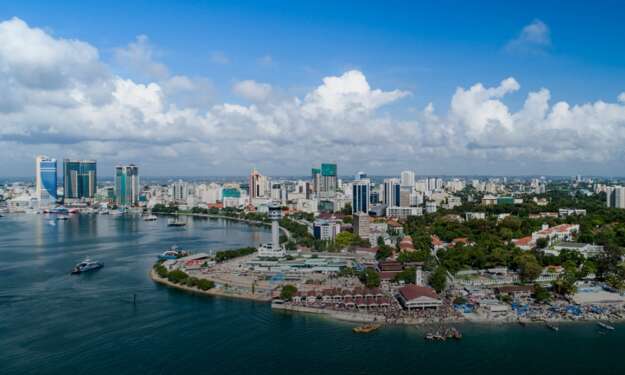Despite the global economic shocks caused by covid-19, in July 2020 the World Bank Group (WB), Tanzania’s development partner categorized Tanzania as a lower middle-income country—which was one of the crucial country milestones achieved over the past year.
Tanzania which is currently eyed to be one of the best performers in the region, despite the pandemic shocks, economy forecasters such as Focus Economics anticipated the East African economy to grow by 5.8 per cent.
However, the WB latest Tanzania economic update proposed several key issues to be prioritized by Tanzania to keep a tight grip on the economic status and ascend further.
Tanzania is currently striving to realize its Development Vision (TDV) 2025 further, by having institutional framework changes on crucial sectors—on the mining sector, taxing, investment and transforming Tanzania into a strategic powerhouse by utilizing its natural gas.
The bank’s Raising the Bar: Achieving Tanzania’s Development Vision, exposed various issues including why the country needs to analyze “the quality of past growth in delivering broad welfare gains and to develop a roadmap to guide its further transition to a successful middle-income economy with a high level of human capital development, high-quality livelihood opportunities, and broad gains in living standards, as outlined in TDV 2025,” according to World Bank.
According to a March 3 World Bank publication, the report paints Tanzania’s development sustenance on three strategic pillars, which are sustaining robust medium-term growth in a challenging external environment, improving the inclusiveness of growth and its impact on poverty reduction, and fostering upward economic mobility and strengthening economic security.
The bank’s strategic pillars are rather a on point with TDV’s objectives, whereby Tanzania eyes a competitive economy capable of producing sustainable growth and shared benefits, but also acquiring a high-quality livelihood.
Read:Tanzania maritime sector eyes more cargo on busiest port
Report highlights
Tanzania as an LMIC need to do more to realize its middle-income ambitions. According to WB, Tanzania ought to put rather concerted efforts to regain economic momentum snatched by the grilling shocks of the virus and expanding economic opportunities at the same time.
More importantly—the private sector investment ought to be placed at the centre of sustainable development—this can be traced through the performance of the sector in the past two decades.
Further, the report argued, “slowing of private investment growth in recent years and urges the government to accelerate current efforts to improve the business climate. The report also underscores the double challenge Tanzania is facing – attracting private investment and boosting productivity – and suggests that policies to accelerate the uptake of digital technologies can play an important role on both fronts and promote inclusive growth,” World Bank noted.
On the other side of the fence, unemployment and uneven job creation, low levels of education, high population growth and limited access to education opportunities and jobs particularly among women and girls—put a strain on nabbing the power of inclusiveness of economic growth but also marring poverty reduction efforts and expanding the middle class.
World Bank argues that the current economic expansion has been driven by sectors that employ relatively few workers, especially from poor households. While, the wealthier portion of Tanzanians, especially those in urban households with greater human capital and productive assets, we’re better positioned to seize opportunities generated by economic growth, and the imbalance in economic opportunity widened the income gap between households.
However, the growth of the population in Tanzania makes job creation extremely urgent at the same time intensifying pressure on the labour market.
“Human capital investments enable households at all income levels to access economic opportunities and benefit from growth, and this is critical for breaking the lack of intergenerational mobility to more employment opportunities and moving to more productive economic sectors,” according to the report authors.
As one of the fastest-growing economy in the region, Tanzania can learn from the collective experience of successful LMICs and forge its pathway to economic transformation. Thus—the bank spotted five priority areas to make progress within the strategic pillars.
Five priority areas
Accelerating productive investment which is dominated by strategic reforms on investor protection and retention, but also the management of legal risks associate “associated with the transition away from investor-state dispute settlement and setting up a strong, transparent and accessible grievance redress mechanism that de-escalates investor concerns before they become disputes or exits,”
Giving human capital development a priority, as Tanzania becomes a populous country, a strategic human capital plan is needed to cater for the poor and underserved population. “Improved access to basic education and health services for women and adolescent girls could generate enormous social and economic benefits,” World Bank argued.
Agricultural transformation is key in delivering rather great output in all three pillars. However, the report suggests that the private sector hand in the agriculture sector has yet not scratched the surface, due to an unfavourable regulatory environment.
Digital technology is crucial in fostering modern development, thus Tanzania needs to leverage its potential. The reports find the country has the least invested ICT sector with a weak backbone network infrastructure, lacking—effective Open Access Policy, constrained independence and low capacity of Tanzania Communication Regulatory Authority, low levels of income, digital literacy and domestic market size.
“This is holding back progress in closing the country digital divide and leveraging digital technologies for inclusive growth,” the report noted.
Building institutions and capabilities are rather important for Tanzania, which has been developing a strong commitment to macroeconomic stability, “which needs to be maintained and strengthened while making further efforts to boost domestic revenue mobilization, improve the efficiency of public expenditures, and mobilize resources for development without jeopardizing fiscal sustainability,” the bank noted.
